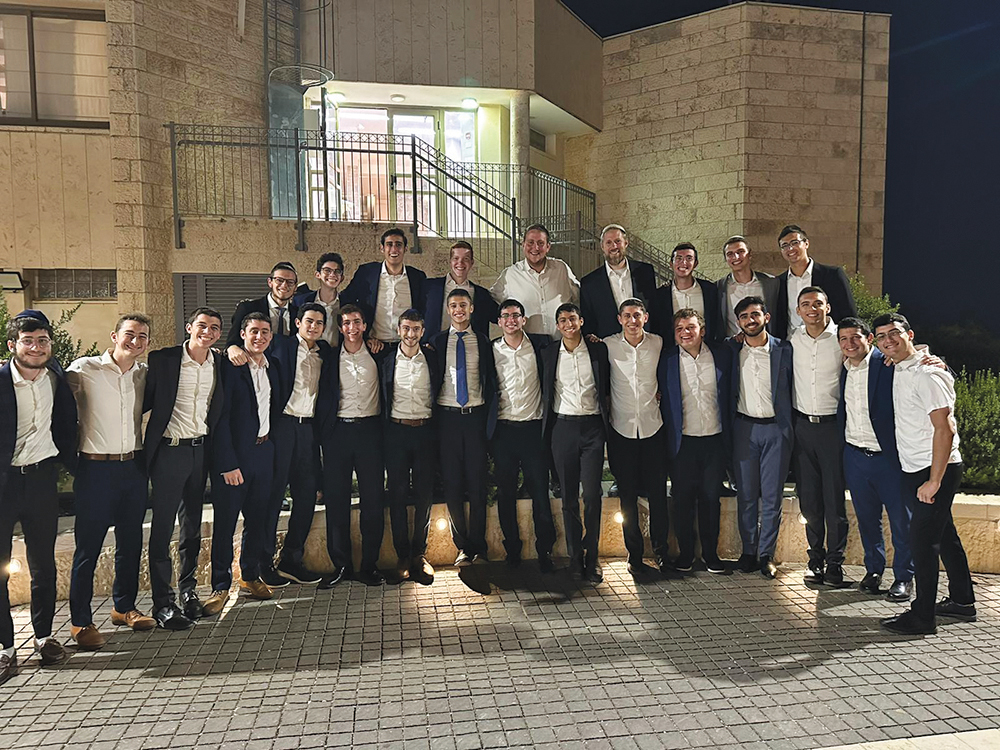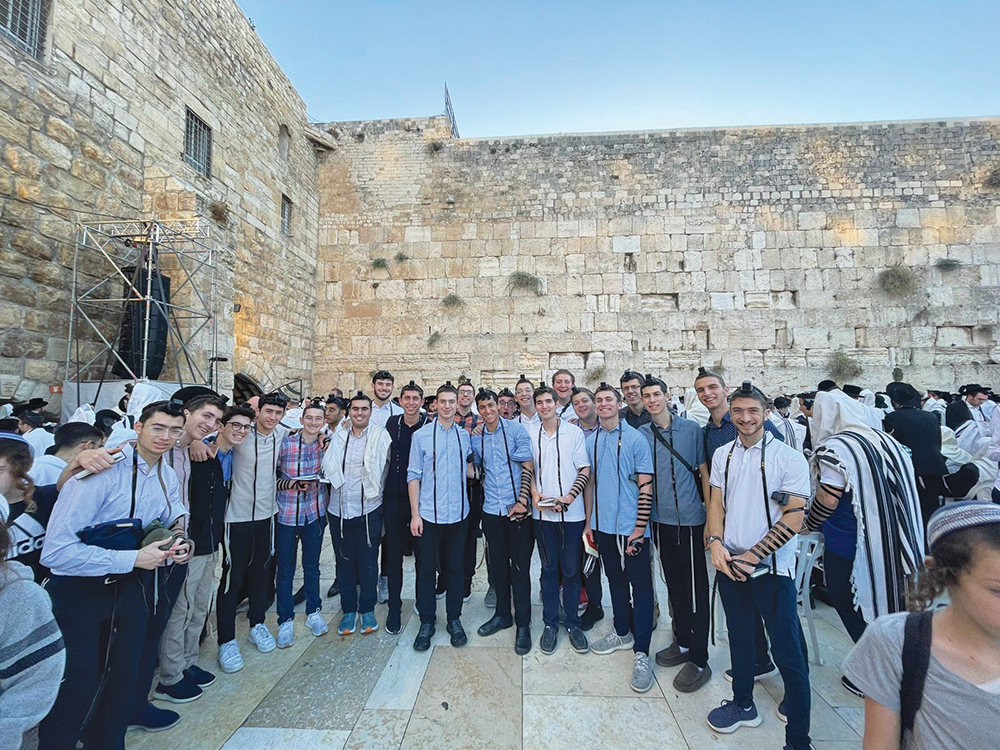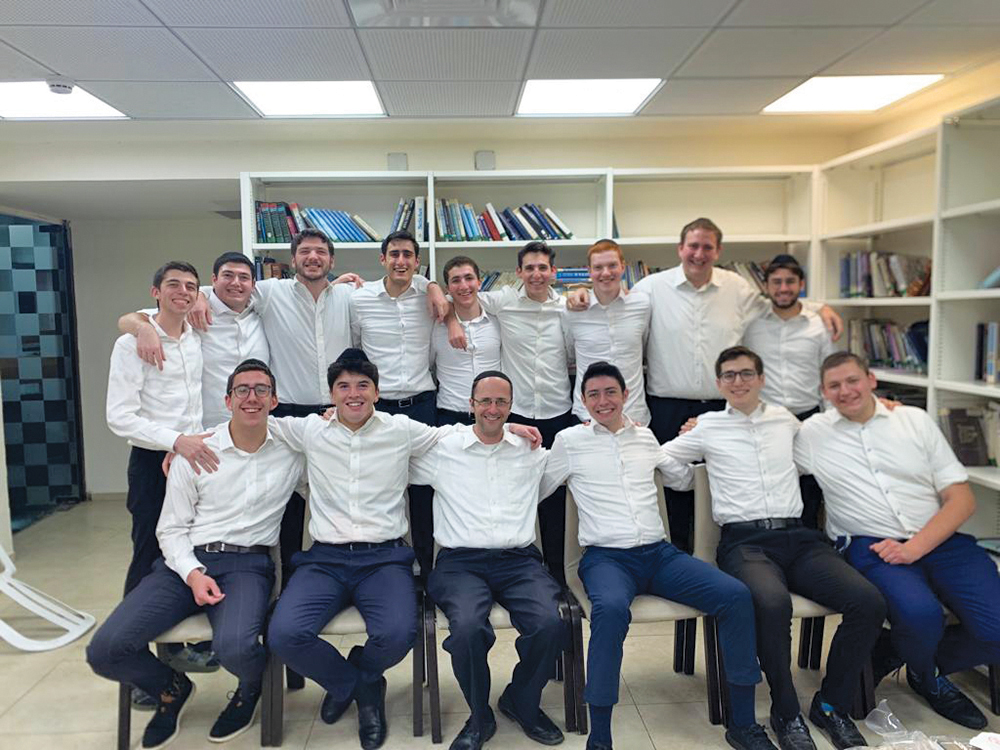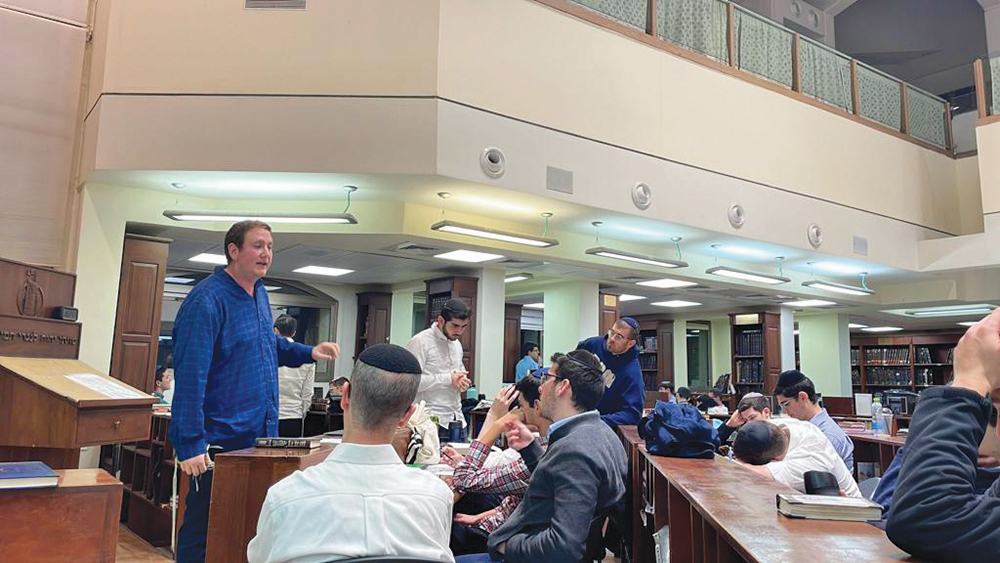
Gavri Segal from Manhattan is spending his year at Yeshivat HaKotel in the Old City, where he is expanding his Hebrew skills and being immersed in a Hesder environment. Gavri grew up going to the Mizrachi Synagogue on the Lower East Side, and attended Manhattan Day School for elementary school. He commuted to Teaneck for high school and attended TABC, but he has his eyes set even further, and is now considering finishing his education by attending college in Israel.
Why were you drawn to HaKotel and what makes it different from all the other programs you considered?
The rebbeim are incredible, and the large diversity of student backgrounds definitely drew me in—everyone is incredible here. But what really spoke to me was HaKotel’s deeply rooted Zionistic values and encouragement of aliyah. Not to mention, HaKotel is located in the Old City, which is fabulous.

How does HaKotel foster a Zionistic and pro-aliyah environment?
Well, on Simchat Torah we had dozens of people leave the beis to go defend Israel with the IDF, so many HaKotel students have been or are in the army. At HaKotel, that is the norm. So the social environment definitely plays a big role, and many shiurim heavily emphasize that Israel is our home and the place of our people. It would be one thing just to hear about it in shiur, but at HaKotel you see it in action. The combination of the two makes it meaningful.
How do you think HaKotel fits your personality and your own philosophical outlook?
Well, personality-wise, I have a loud and outgoing personality so I enjoy how diverse HaKotel is because I get to make friends from a wide variety of backgrounds. My personality also allows me to take advantage of all the opportunities at HaKotel to lead and inspire others. Hashkafically, at HaKotel the focus on Zionism and aliyah is right at home with my own views, but I also really connect with their approach to Talmud Torah. It does not feel as if I am being forced one way or the other. HaKotel helps direct you, but does not try to take you off the path your parents have taught.

Is there any particular rebbe that you personally connect with?
My morning shiur rebbe, Rav Jesse Horn. He throws a lot of information at us really fast but it helps us build the necessary skills to figure it out on our own. A lot of times he will just give us all the Mekorot and we have to go through it on our own and try to predict what Rav Horn will say. It’s way more interesting for me than if he was just giving us the information. I really like his personality, too—he’s relaxed, funny, and genuinely cares for his talmidim.
What are your favorite shiurim that you attend at HaKotel?
Well there is morning shiur of course, but after that I’d say my weekly chabura with Rav Dovi Fischer. Every Thursday night the same group of talmidim and I meet with him and he chooses a very specific topic and explains it completely in depth. He always says clarity is the most important thing.

That sounds fascinating! What kind of topics have you discussed?
The week before Chanukah we had Chanukah Torah Gems, literally anything about Chanukah that he found interesting. On other nights we spoke about Judaism’s view on celebrating your birthday or secular holidays. It’s really cool to delve into niche topics like that. We also had a chabura on if there is a mitzvah to speak Hebrew, which is very relevant in HaKotel.
What were your expectations going into HaKotel and how have they differed from your actual experience at HaKotel?
Well, I was not considering aliyah nearly as much, so that’s definitely a big change. But I also definitely did not expect to be able to do all the learning. Everyone kept saying that it’s different when you’re actually there and you get really into it but I didn’t realize how true that was. Once you are here though, when you put your mind to it you can do a lot.
On that point, what’s a goal you had coming into the year?
Regardless if it is a mitzvah or not, I definitely want to learn to speak Hebrew. HaKotel is a very integrated yeshiva with Israelis and Americans learning together so there is always a chance to practice. At other yeshivas there’s not as much of a focus on learning Hebrew.

Outside of learning, what else do you enjoy doing in Israel?
Just being in the Old City and exploring the holiest city on earth is incredible. Especially during Selichot before Yom Kippur, it was really inspirational to see thousands of people coming to the Old City. It’s incredible to have that feeling of connection to every Jew in the world.
What does a typical Shabbat look like for you?
I stay in for Shabbat more than most people. Every other week the yeshiva dances down to the Kotel which is very nice and inspiring, and there is usually a tish of some sort for the Americans. In the morning we have a kiddush and after lunch we have the opportunity to explore the Old City and Yerushalayim as a whole. We make sure to be back for Shalaseudes because we always have a really nice speech by one of the mashgiachs of our yeshiva. We have had a few shabbatonim with the yeshiva, too.
What have those shabbatonim been like?
My favorite one by far was in the beginning of the year, in the first two weeks of yeshiva. Our entire shiur went to Rav Horn’s house for Shabbat and it was the first time I was able to gain a better relationship with everyone else in my shiur. We hung out, ate good food, and got to make close friends.
What has been the highlight of your year so far?
Over Chanukah we went on an Eilat trip and it was incredibly inspiring. Getting to actually meet and talk with refugees from attacked kibbutzim was incredibly moving. After Shabbat we sang HaTikvah and lit Chanukah candles together with all of them, and it was definitely a real highlight.
How do you think this year will prepare you for the rest of your life?
I obviously want to live a Torah-based life, and it is so important to find my balance of Torah and Madda. This year gives me the necessities for the Torah aspect and lays out the foundations while also giving me space to build off them.
How has the Israel-Hamas conflict affected your year?
As I mentioned earlier, on Simchat Torah many talmidim and rebbeim from yeshiva poured out of the beit midrash to go up North or down South and defend Israel. There are definitely fewer people here because of that, but HaKotel has become very focused on the conflict, especially as a Hesder Yeshiva—we are still saying Avinu Malkeinu during davening. The conflict has given the rebbeim an opportunity to demonstrate how important Torah is to our lives. Also, the majority of HaKotel has stayed in yeshiva and we have not had a lot of people leave the country.

Anything else you’d like to tell those reading at home?
People have to understand that Israel is the place we are meant to be, especially right now. If we emphasize our whole life that Israel is so important, right now is the time for us students in Israel to stay. However, for the people who must remain outside of Israel, they should be doing everything they can to help those the people of Israel.
Sam Savetsky of Bergenfield is a shana bet student currently studying at Yeshivat Migdal HaTorah in Modi’in.








